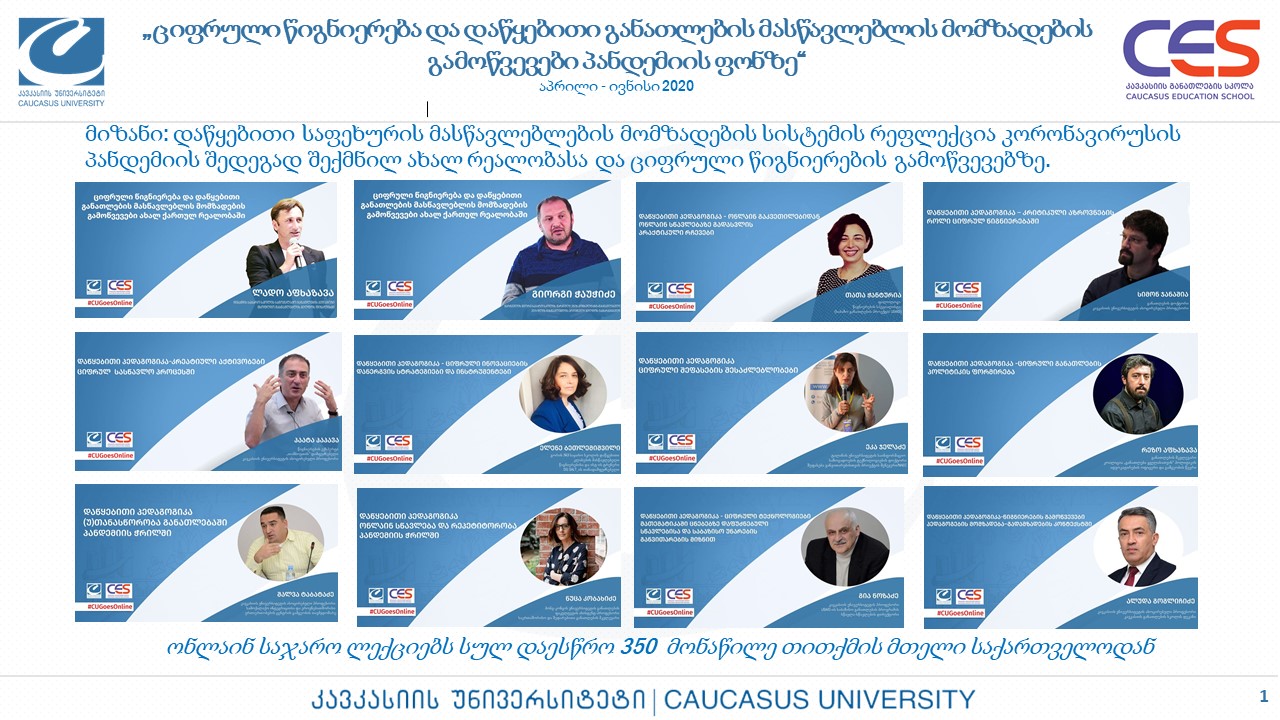 Caucasus University
Caucasus University 
Caucasus Education School
Integrated Bachelor’s and Master’s Degree Program for Teachers of Primary Education (grades I-VI).
"Digital Literacy and the Challenges of Primary Education Teacher Training During the Pandemic “.
On February 26, 2020, the first case of COVID-19 was discovered in Georgia. Based on the recommendation of the Inter-Agency Coordination Council on COVID-19 and by the decision of the government, the educational process was suspended from March 4 in all educational institutions. Due to the increase in the number of cases in the world, on March 11 the World Health Organization declared a pandemic, and on March 21 a state of emergency was declared in Georgia and the educational process continued online.
The teaching process continued remotely (online) at Caucasus University, this included the Integrated Bachelor’s and Master’s Degree Program for Teachers of Primary Education (grades I-VI) of Caucasus Education School.
The main priority of this program is literacy, which consists of reading and reading comprehension processes, includes skills in comprehending written texts and using these texts for individual and public purposes, also known as "reading to do" (Stiggings, 1982). Such a view on reading is best suited to modern society, as today the greatest emphasis is placed on the students' ability to use information obtained from a text (Organization for Economic Cooperation and Development, 2010; 2005; 2001). In fact, we can say that the attention of education professionals shifts from the ability to read freely and comprehend the basic idea to the ability to apply what is read to new situations or projects (Coulombe, Trembly, & Marchand, 2004; Smith, Mikulecky, Kibby, & Dreher, 2000).
In order to clearly see the problems of general/primary level education presented in the conditions of the pandemic, it is enough to get acquainted with the results of the International Literacy Study (PIRLS - Progress in International Reading Study) 2016, according to which Georgia's indicators for each level are significantly lower than the international average: Only 2.5% of fourth graders living in Georgia have passed the highest level of the PIRLS international scale, 22% high, 60% medium and 86% low level. 14% of students found themselves below the low level of the international achievement scale, which means that 14% of students in Georgia found it difficult to complete even the tasks set for the low level.
However, the pandemic that forced us to switch to remote learning at all levels of education has exacerbated the challenges of primary school teacher training in the modern information world, where digital media and the Internet have become increasingly important. Literacy has gained special importance and concepts such as "digital literacy" and "information literacy" have emerged, which refer to the competencies of learning and working through the computer and the Internet (Beselia and Papava, 2011). ePIRLS - Innovative Online Reading Assessment serves the purpose of assessing these competencies.
Georgia ranks last in the 2016 ePIRLS rankings for each level of achievement, and the indicators are significantly lower than the international average: only 1% of students were able to successfully complete the highest level tasks, a fifth completed the high level, almost two-thirds average, 86.5% of participants completed only low-level assignments, and 15% showed results below the lower level (Table # 5.7).
Given these circumstances, the project "Digital Literacy and Challenges of Primary Education Teacher Training During the Pandemic" will be implemented within the framework of the Integrated Bachelor’s and Master’s Degree Program for Teachers of Primary Education (grades I-VI), the main motto of which was - Turn the pandemic into an opportunity to succeed in digital literacy!
The aim of the project was to reflect on the new reality and digital literacy challenges posed by the pandemic.
Besides the students of the Caucasus School of Education, students of any university as well as entrants and primary school teachers were able to attend the public lectures.
12 public lectures were held within the project:
"Digital Literacy and Challenges of Primary Education Teacher Training in the New Georgian Reality".
1) Lado Abkhazava - Civic Education Teacher of Chibata Public School, finalist of the 2019 World Teacher Award.
April 22, 2020
2) "Digital Literacy and Challenges of Primary Education Teacher Training in the New Georgian Reality".
Giorgi Chauchidze - Georgian language consultant-teacher at Marneuli # 2 Public School, winner of the 2019 National Teacher Award.
April 24, 2020
https://drive.google.com/file/d/1t3wy8yO7oHUYKoxW5paKHUk9KoB_AmHi/view?usp=sharing
3) "Elementary Pedagogy - Practical Tips for Moving from Online Lessons to Online Learning".
Tata Chanturia - Philologist, Literature Specialist (Basic Education Project / USAID).
May 1, 2020
https://drive.google.com/file/d/1EI66NefnqmU7ekEt6h-9z6KnFxWUMzys/view?usp=sharing
4) "Elementary Pedagogy - The Role of Critical Thinking in Digital Literacy".
Simon Janashia - Doctor of Education, Associate Professor at Caucasus University.
May 5, 2020
5) "Primary Pedagogy - Creative Activities in the Digital Learning Process".
Paata Papava - Associate Professor at Caucasus University, Literature Expert, Founder of Teamboat.
May 7, 2020
https://drive.google.com/file/d/1KnA0VhHq96rEVgm0hEKjZ77ervTI7AYZ/view?usp=sharing
6) "Primary Pedagogy - Strategies and Tools for Introducing Digital Innovation".
Elene Betlemishvili - Elementary school teacher at Gori Public School # 3, literacy and ICT trainer, co-founder of DG Salt.
May 13, 2020
https://drive.google.com/file/d/1qLCCcXxpSJFDtkGq1z3NT41Zt4qiHw-t/view?usp=sharing
7) "Primary Pedagogy - Digital Assessment Opportunities".
Eka Jeladze - Doctor of Information Society Technologies at Tallinn University, Evaluation for Development Project Manager/NAEC.
May 15, 2020
https://drive.google.com/file/d/15_GYhggJShzz6V4FsMY90X2CB2EISRs_/view?usp=sharing
8) "Primary Pedagogy - Formation of Digital Education Policy"
Rezo Abkhazava - Education Researcher, Education Advocacy Officer and Board Member of the Education for All Coalition.
May 19, 2020
https://drive.google.com/file/d/1mbZjCHl4HIcVwe5iW6rKw_Zdi-IeGAHq/view?usp=sharing
9) "Primary Pedagogy - (in)equality in education in the context of the pandemic."
Shalva Tabatadze - Associate Professor at Caucasus University, Chairman of the Board of the Center for Civic Integration and Interethnic Relations.
May 21, 2020
https://drive.google.com/file/d/1V4FawOT7viov2ui-RiwohpwATCNtly5O/view?usp=sharing
10) "Primary Pedagogy - Online Teaching and Tutoring in the Pandemic"
Nutsa Kobakhidze - Researcher of International and Comparative Education, Assistant Professor at the Faculty of Education, University of Hong Kong.
May 27, 2020
https://drive.google.com/file/d/10n3lvvOb5ALFjFkE32ZpHKR085fqbx8m/view?usp=sharing
11) "Elementary Pedagogy - Digital Technologies for Concept-Based Teaching and Basic Skills in Mathematics"
Gia Nozadze - Caucasus University Professor, Director of USAID Basic Education Program.
June 2, 2020
https://drive.google.com/file/d/1hbiNRF3weOTxlKanSbh9MdXNIlFHem9P/view?usp=sharing
12) "Primary Pedagogy - Literacy Challenges in the Context of Teacher Training".
Aluda Goglichidze - Associate Professor at Caucasus University, Dean of the Caucasus Education School, Academic Head of the Integrated Bachelor’s and Master’s Degree Program for Teachers of Primary Education (grades I-VI).
June 5, 2020.
https://drive.google.com/file/d/1y2ypi547WcI78Yam3k2bwDzFB6FVSl4G/view?usp=sharing
Based on the evaluations and feedback of the participants, Caucasus Education School plans to implement a similar project in the future.


